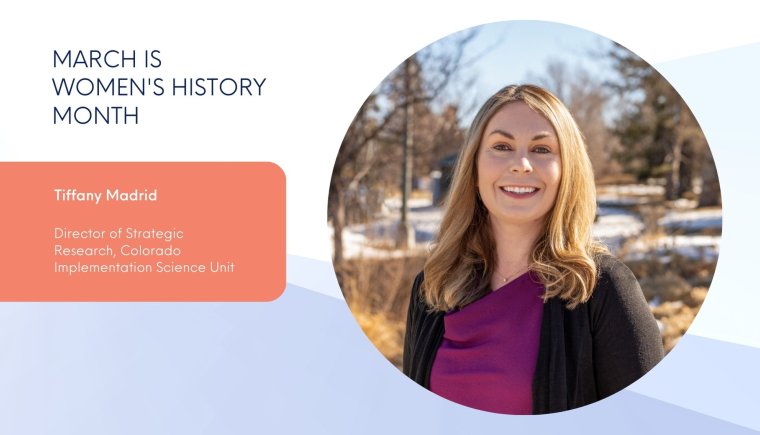Capturing the Spirit: Women’s History Month

March is Women’s History Month and Wednesday, March 8 is International Women’s Day. We caught up with one of the newest team members at the Office of Children, Youth and Families to hear her thoughts. Tiffany Madrid is the Director of Strategic Planning at OCYF’s new Colorado Implementation Science Unit (CISU).
Q. What do Women’s History Month and International Women’s Day mean to you?
A. There is a long, entrenched history of women’s accomplishments going unrecognized, needs going unserved, strengths being under-utilized, and voices being silenced. International Women’s Day is not just a celebration and recognition, but it symbolizes humanity’s progress in human rights. It carves out a dedicated time for communities around the world to take stock of and celebrate women’s contributions. And it promotes human rights by furthering conversations around gender equality, reproductive rights, and the need to eradicate violence and abuse against women.
I think it is particularly important for governments around the world to recognize, communicate and celebrate International Women’s Day. Such intentionality helps to create safe public spaces for women to elevate their needs and shape how socio-economic decisions are made that directly impact them, their children and their families.
Q. What advice would you give to your younger self?
A. In my younger years, perhaps like many young people, I thought I was invincible and was fiercely independent. Today, I have a healthy appreciation of my mortality and the adage «it takes a village.» I’d tell my younger self to focus more on relationship building and to be cognizant of how people might show up throughout your life. You may meet someone thinking that it’s the only interaction you’ll ever have with that person, but the reality is that you never know how many times that person might show up in your life in various spaces — and that person might be an important part of your village someday. Be kind, show interest, and approach meeting someone as though it’s the beginning of an ongoing relationship with them.
Q. How has working in the field of Implementation Science helped you grow and enhance your career as a woman?
A. Implementation Science is part of a much larger movement around evidence-based policymaking that I have committed my career to advancing.
Evidence-based policymaking is the idea that policies that impact the public should be based on, or informed by, the best available research and evidence. In many ways, advancing evidence-based policymaking is both an art and a science. It requires one to be a science communicator, connecting with audiences to translate technical information in a way that it can be understood and acted upon. It also requires an understanding of how research and evidence is generated, and which scientific approaches should be used and when. And importantly, it requires that we ask «for whom is a policy going to work for and under what conditions» and «whether there is enough information to know if a policy is capable of producing an intended outcome.» As a woman who has felt the impact of policies not designed for women, and as a woman working in the field of evidence-based policymaking, I feel a deep responsibility to generate knowledge and advance policies that have the potential to work for all.
Q. Tell us about an achievement you are proud of.
A. One of them is my journey into motherhood. Anthropologists call this journey «matrescence,» or the physical, emotional, hormonal, and social transition to becoming a mother.
When I had my son four years ago, I didn’t know how difficult matrescence would be, especially as a working woman! I had no real understanding of how having a child would impact my health, my relationships, or my career. This is in part because during my youth I routinely heard «women can have it all» (read: manage seamlessly career and traditional family duties). I grew up believing this. And only in recent years have I heard women speaking out against this notion by providing earnest advice around work-life balance.
As I experienced matrescence while working to advance my career — my journey to «having it all» — I found myself deeply understanding the backlash around the notion of «having it all.» I was working frantically to juggle self-care, friendships, my marriage, household duties, a workload and caring for my child. And I found it impossible to play the roles of the friend, the wife, the housekeeper, the cook, the professional and the mother all at the same time, do it well, while also finding time to tend to my needs.
An accomplishment I’m proud of is figuring out what I need to implement work-life balance. What I need is to pause, assess priorities, adjust expectations, and ask for help when needed. Though these things are hard for me to do sometimes, I continuously remind myself of their importance.
Q. Have you ever experienced gender inequality in the workplace throughout your career?
A. Many times. I’ll share my first experience, which was years ago when I was working as a sales representative for a multinational, cutting-edge technology company. I was hired at the same time as four men. Despite having notably more education and years of experience, I found out during an off-the-clock conversation that I was hired at an hourly wage that was fifty cents less per hour than each of them. In today’s economy, fifty cents doesn’t sound like a lot! But back then that was a significant amount of money! When I learned of the pay disparity, I felt undervalued and discriminated against, but mostly I felt defeated. At the time there seemed to be no recourse — there weren’t strong laws in place to ensure equal pay for women, and technically it was against company policy for employees to discuss their pay. This experience piqued my interest in policymaking and the need to dismantle systemic inequities through strong laws.
Q. What’s your favorite inspirational quote to live by?
A. “I’ve learned that people will forget what you said, people will forget what you did, but people will never forget how you made them feel.” ― Maya Angelou
More Posts







